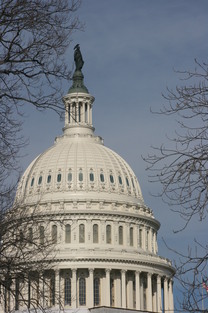| | Americans on a fairy tale ride of epic proportions. We’ve been to the brink of a fiscal cliff, cowered from the wicked witch of sequestration and refused to let the powerful pawn their responsibilities off on the 2012 elections. We have watched as Standard & Poor’s lowered the nation’s credit rating and Fitch put it on notice for the same, and now we have stared again into the abyss of insolvency only to be spared at the last moment by a “deal.” That deal includes the establishment of budget talks between the House and Senate in the hopes of finding a long-term solution to which both sides can agree. Meanwhile, the government will run out of money again on Jan. 15, and the nation’s debt ceiling will need to be raised again some time around Feb. 7. By then, the 2014 elections will loom as another opportunity to dig in and sling mud. Is it just me, or are those breadcrumbs beginning to look a little moldy this time around? Tea party Republicans, led in part by Utah’s Sen. Mike Lee, are properly being criticized for forcing the just-concluded crisis over some fairy-tale quest to topple Obamacare’s impenetrable castle. They knew from the start they didn’t have enough soldiers for that. The small concession they won from the administration — to more closely verify the eligibility of people who get subsidies for health insurance coverage — is a far cry from storming the castle. But the tea party’s version of Pickett’s Charge was symbolic of how adherents to all political sides have acted since the decision to fund bailouts in 2008 cost people their political lives. If those breadcrumbs don’t look familiar to you, recall that more than two years ago Congress backed away from a seemingly unsolvable debt ceiling impasse by setting up a “supercommittee” to negotiate a long-term budget deal. It was equally divided between Republicans and Democrats, senators and representatives. This supercommittee was given a deadline and a threat: Succeed, or a series of automatic spending cuts will kick in. But, of course, those cuts wouldn’t touch Social Security, Medicaid, Medicare, veterans’ benefits, unemployment or food stamps. The cuts would come from spending increases, not from real budgets. The supercommittee failed miserably. The budget cuts took place amid dire warnings, and they remain the only tangible (if piddling) moves toward any real austerity. So why on earth should we expect anything from more talks? Is either side offering to give up some of what it wants in exchange for some of what the other side wants? It’s tempting to wonder how one decision might have changed all of this. Three years ago, President Obama appointed a bipartisan 18-member National Commission on Fiscal Responsibility and Reform. I’m not sure what he hoped would come of that. He couldn’t seriously have expected a result that represented only his desires to tax the rich and keep the spending going. The co-chairs, Sen. Alan Simpson and former Clinton administration chief of staff Erskine Bowles came up with a plan that would have raised the Social Security retirement age to 69 and gradually reduced its benefits for younger people, cut defense and farm subsidies and increased the federal gasoline tax by 15 cents a gallon. Income tax rates would have come down and tax deductions disappeared. It was a good plan. Too good, apparently. Because many of the politicians on the commission didn’t support it, Obama wouldn’t touch it. But what if he had embraced it as a starting point for negotiations? How would Democrats have reacted? How would Republicans have countered? We’ll never know. All we can do now is try to enjoy the ride to the edge of the next cliff. I don’t know of any fairy tale where the ultimate hero is a committee. |
|
0 Comments
Your comment will be posted after it is approved.
Leave a Reply. |
Search this siteLike what you read here? Please subscribe below, and we'll let you know when there is a new opinion.
The author
Jay Evensen is the Opinion Editor of the Deseret News. He has more than 40 years experience as a reporter, editor and editorial writer in Oklahoma, New York City, Las Vegas and Salt Lake City. He also has been an adjunct journalism professor at Brigham Young and Weber State universities. Archives
July 2024
Categories
All
Links
|


 RSS Feed
RSS Feed

